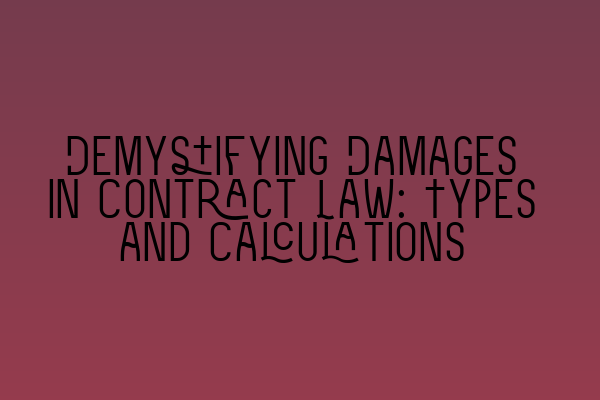Demystifying Damages in Contract Law: Types and Calculations
Contract law governs the agreements and obligations between parties involved in a legal contract. One crucial aspect of contract law is the concept of damages, which involves the compensation awarded to a party who suffers a financial loss due to a breach of contract. Understanding the different types of damages and how they are calculated is essential to navigate the complexities of contract law effectively.
Types of Damages
1. Compensatory Damages: Compensatory damages aim to financially restore the injured party to the position they would have been in if the breach had not occurred. These damages are designed to cover the direct losses suffered, such as lost profits, costs incurred, or any other specific damages resulting from the breach.
2. Consequential Damages: Consequential damages are also known as special damages. Unlike compensatory damages, consequential damages are not directly caused by the breach. Instead, these damages result as a consequence of the breach and are reasonably foreseeable. For example, if a delayed delivery of goods in a contract causes a loss in sales for the buyer, the resulting damages would be considered consequential.
3. Incidental Damages: Incidental damages are the expenses incurred by the injured party as a result of the breach. These damages may include costs such as inspection fees, storage fees, or any other reasonable expenses that the injured party had to bear due to the breach.
4. Punitive Damages: Punitive damages are not commonly awarded in contract law. Unlike compensatory damages, punitive damages aim to punish the breaching party rather than compensate the injured party. These damages are typically awarded in cases involving willful misconduct, fraud, or gross negligence, as a way to deter such conduct in the future.
Calculation of Damages
Calculating damages in contract law depends on the type of damages being claimed and the specific circumstances of the case. Here are some common methods used:
1. Expectation Damages: Expectation damages aim to put the injured party in the position they would have been in had the contract been performed as agreed. To calculate expectation damages, the court considers the financial loss suffered by the injured party due to the breach, including lost profits, costs incurred, and any other damages that would arise in the normal course of business.
2. Reliance Damages: Reliance damages aim to compensate the injured party for the costs they incurred in reliance on the breaching party’s promise, even if such costs do not result in actual loss or lost profits. These damages cover expenses such as preparation costs, expenses incurred in performing the contract, or other costs directly related to the reliance on the contract.
3. Restitution Damages: Restitution damages are awarded when one party has conferred a benefit on the other party under the contract, but the contract is not performed. These damages aim to restore the injured party to the position they were in before the contract, by requiring the breaching party to return any benefits received as a result of the contract.
Conclusion
Damages in contract law serve to provide compensation for the harm caused by a breach of contract. Understanding the types of damages available and how they are calculated is crucial for individuals and businesses engaging in contractual agreements. Whether you are seeking compensatory, consequential, incidental, or punitive damages, it is essential to consult with a qualified solicitor who can guide you through the complexities of contract law and ensure you receive the appropriate compensation.
For more information on related legal topics, feel free to check out these articles:
– Mentorship for Aspiring Solicitors: Nurturing Talent in the Legal Field
– Legal Challenges and Pitfalls: Navigating the Complexities of the Legal System
– Mentorship for Aspiring Solicitors: Finding Guidance on Your Legal Journey
– Exploring Alternative Dispute Resolution: An Effective Approach to Legal Conflicts
– The Art of Contract Drafting and Negotiation: Skills Every Solicitor Should Master
